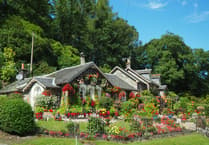A hotel which controversially built meeting rooms which it said were required for world leaders attending the G7 conference without planning permission has unveiled new plans which it says will comply with an enforcement notice issued by planning authorities.
The Carbis Bay Hotel has applied to Cornwall Council for permission for habitat enhancement works and viewing area on the site where they unlawfully built the G7 meeting rooms.
World leaders including Boris Johnson, Joe Biden and Emmanuel Macron all stayed at the hotel during the G7 conference in 2021.
Cornwall Council previously issued an enforcement notice ordering the hotel to remove the pods and meeting rooms and return the site to its original form. It had previously been an area with trees and wildlife.
The hotel had appealed against the enforcement notice but lost, it has since complied with some of the requirements of the notice and last year Cornwall Council agreed to relax some of the requirements including extending the time to comply until the end of February this year. The initial notice had required the changes to be made within six months.
In a design and access statement submitted with the new application the hotel explains that the buildings, services and decked area with supporting structures have all been removed from the site as directed by the enforcement notice.
They state that a resurfaced track which was put in place for the unauthorised buildings was set to remain in place following a request from the fire service to enable fire engines to be able to reach the hotel swimming pool which is used as an emergency source of water.
A fence which was installed as part of the original plans had also been ordered for removal, but the hotel says that it is required to comply with health and safety, but states that it will be replaced with a lower post and rail fence.
The documents state: “The scheme has been designed to primarily restore the site to as close to its original condition as possible, whilst causing as little harm to the existing surroundings as possible.”
It adds: “The great majority of the site will be given back to nature, with public access restricted, and restorative planting undertaken.”
And it continues: “In order to positively support users of the adjacent South West Coast Path, the existing tarmac area will be retained as a rest area, with public seating and views over the bay. Educational boards will be placed within this zone to provide further information on the surrounding habitats and locally important species of relevance to coast path users.
“New seating and a raised planter will be created using the reclaimed timber from the base of the existing timber balustrades on site, to minimise waste. The raised planter is intended to provide a safer ‘touch and feel’ zone for children using the coastal path with a selection of coastal plant species.”
In a final summary the documents explain: “The applicant and their consultant team have worked to find a more sustainable solution to the enforcement notice requirements, limit further environmental harm and provide enhancements that leaves a beneficial legacy.
“The proposals put forward in this application are therefore commended to Cornwall Council as an appropriate response to the enforcement notice requirements, delivering against the project aims of improving sustainability; supporting health and wellbeing; and supporting local biodiversity.”
Two public comments have been submitted regarding the application. David Hurst wrote: “This area has been subject to enforcement and, rightly, upheld by the inspectorate. This is just a cynical attempt to get round that enforcement. These ‘minor works’ are (hotel owner) Mr Baker’s attempts to stop his requirement to remove the tons of concrete he poured into the cliff face and restore it back to its original state. This application should not be allowed.”




